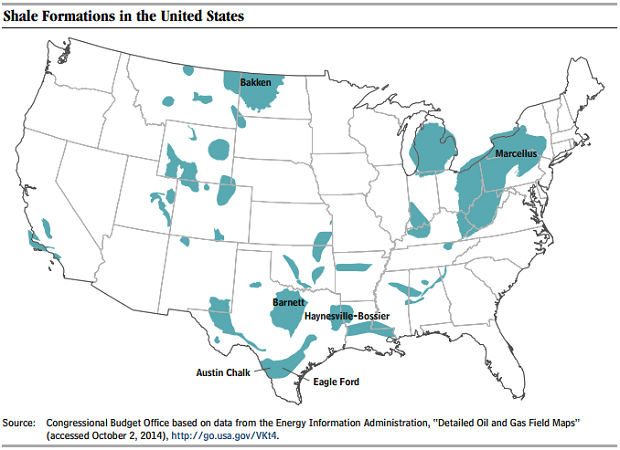Hydraulic fracturing, or fracking, of shale resources has boomed in the past 10 years, boosting economic growth and tax revenues, according to a Congressional Budget Office report released Tuesday.
Shale resources were difficult to cultivate a decade ago, but thanks to fracking they now produce 30 percent of liquid fuels and 40 percent of natural gas. The Energy Information Administration projects the production of shale gas to grow by 60 percent over the next 10 years, and the production of tight oil from shale deposits to grow by 30 percent.
As a result, prices have dropped significantly, and will continue to stay low. “CBO estimates that if shale gas did not exist, the price of natural gas would be about 70 percent higher than currently projected by 2040,” according to the report.

Energy is an input to every product, meaning cheaper energy can fuel economic prosperity. By increasing the supply of energy, fracking has increased productivity and increased economic output. The CBO report describes multiple economic indicators that improve because of fracking’s economic boost. “The increase in GDP just described represents increased income, which allows people and firms to save and invest more in productive capital, and the higher productivity just described increases wages, raising the amount of labor available,” according to the report.
Fracking is helpful to the economy, but it is not an economic cure-all. GDP will be about 1 percent higher in 2040, thanks to fracking. That is a significant improvement that will create noticeable improvements in American’s daily lives, but it cannot power economic growth by itself.
Thanks to the related increase in economic growth, fracking will boost tax revenues. By 2040, tax revenues will be about 1 percent higher than they would have without shale development. Again, this is not a budgetary cure-all, but Congress needs all the help it can get in balancing the federal budget.
There is at least one policy change that could help expand this activity. Crude oil exports are currently banned in the United States. Lifting that ban would benefit U.S. consumers and producers of oil products, although domestic refiners would be hurt. CBO cites one study that shows the price of oil products would fall by about 5 to 10 cents per gallon.
The CBO did not attempt to calculate fracking’s effect on water quality and availability, but did note that regulations from the Clean Water Act and Safe Drinking Water Act apply.
Even though fracking’s environmental effects were not analyzed, the report clearly shows fracking is beneficial for the U.S. economy. The economy needs a boost, and more fracking can only help.
